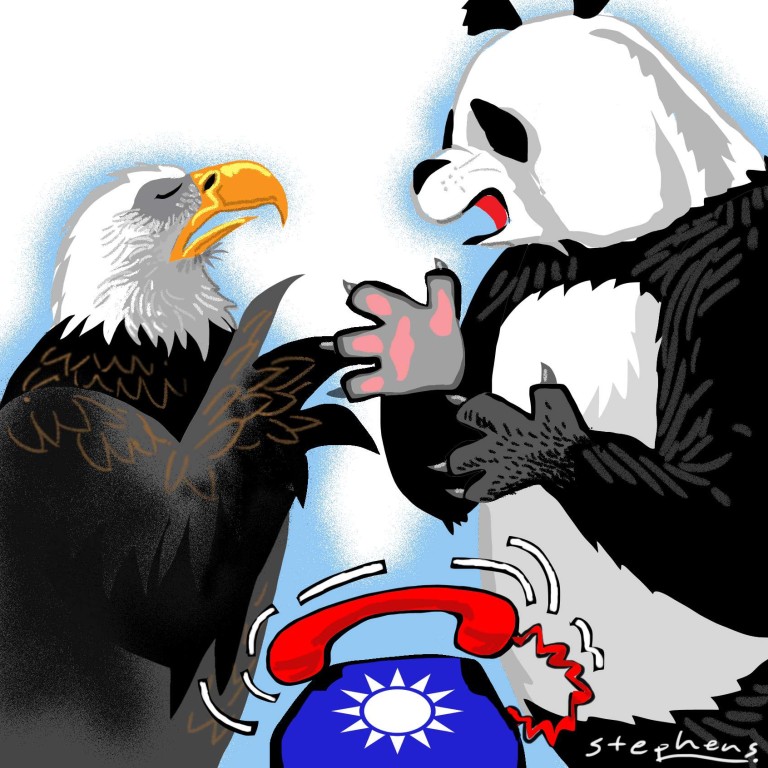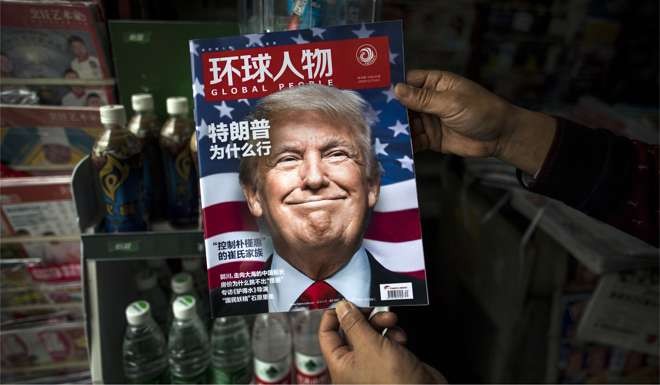
One phone call won’t change US policy on Taiwan – or relations with China
Tom Plate says Beijing is right not to lose its cool over the unexpected talks between the US President-elect Donald Trump and Taiwanese leader Tsai Ing-wen

The “she” being Tsai Ing-wen, the president of what this Cornell Law School graduate and many Taiwan islanders term the Republic of China (but not recognised by the UN or dealt with officially by many of our 194 nations). By inducing Donald Trump, still on schedule to become US president next month, to accept her congratulatory long-distance phone call (what could be more innocent, right?), the island’s anti-unification leader brought the global spotlight down on her 24 million constituents living in the shadow of the mainland – and managed to set ajar decades of delicate hard work between Beijing and Washington.
With one phone call! Viewed purely as a spectator sport, mark it down as a home run for Taiwanese diplomacy. Notwithstanding her bumpy public opinion ratings at home, Tsai is a clever woman. Maybe Zhongnanhai could learn from her – how in today’s Twitter-diplomacy, less can be more.
Watch: Trump talks by phone with Taiwanese president
But was Tsai using Trump, or vice versa? A widespread view in the US is that the American president-elect may know his real estate game better than a Rockefeller but, on the evidence presented, he doesn’t know his geopolitics from his mooncakes. What’s more, every new president faces a steep learning curve – though Trump’s all too often looks to be more a vertical line than anything curvaceous.
On the evidence presented, the US president-elect doesn’t know his geopolitics from his mooncakes
Perhaps the slow motion (as of this writing) in picking a secretary of state should actually be applauded – and is evidence that there is more to Trump the international tactician than meets the eye. As the face of American diplomacy, after that of the president’s, this highest-profile appointment is important, especially in a know-little administration. The late Theodore Sorensen, president John Kennedy’s storied speech-writer, would often remark that all major US foreign policy decisions are perforce presidential ones, no matter how forceful the sitting secretary of state. But Trump seems so categorically unschooled in international issues that perhaps, at bottom, he does really know what he really doesn’t know. And that would be the start of on-the-job wisdom.
The time period between the election and the inauguration of a new American president is both too short – to get those cabinet executive positions filled – and too long. Much can go wrong with so much time to blab – or tweet.
What does Donald Trump’s phone call with President Tsai mean for future US arms sales to Taiwan?

Trump may pick Xi Jinping’s long-time friend as US ambassador to China
In the book Difficult Transitions: Foreign Policy Troubles at the Outset of Presidential Power, by two highly accomplished career foreign policy officials, Kurt Campbell and James Steinberg, a tableau of no fewer than 20 guidelines are offered for transition managers. Two of relevance are: “Defer decisions, when possible, until confident of the facts, while recognising that there will be often gaps in information”; and, “Think carefully before reversing predecessors’ policy decisions”.
Toying with the mainland’s emotions about Taiwan is, rather, the road to ruin
For that second point, the Trump people have put it out that the Taiwan phone call was premeditated, no slip in judgment. If true, however, this might suggest a fundamental rethink of the Sino-US relationship. This would be unwise both domestically as well as internationally. Trump won the electoral college vote – our bizarre system – not the popular vote (Hillary Clinton won that by more than two million). He had a mandate only to perform competently, not upend decades of American diplomacy that has helped avert major war in East Asia. Toying with the mainland’s emotions about Taiwan is, rather, the road to ruin.
The Trump transition may prove a trying period even for the best-humoured officials of Zhongnanhai. Even so, Campbell and Steinberg, in recounting all the anti-China malarky from past campaigns (Dwight Eisenhower, John Kennedy, Ronald Reagan, Bill Clinton and George W. Bush), would suggest they not worry: “Yet in every case, once taking office, the new president found himself adopting policies that bore a remarkable resemblance to those of his predecessor – a dramatic illustration of governing realities intruding on intended policies.”

Why Beijing and Taipei must learn the art of compromise
So what should China do? Barring some stupendously stupid move – say, a Trump invitation to the Dalai Lama for a round of golf, or for a weekend at Mar-a-Lago – the Xi Jinping ( 習近平 ) administration should stay as cool as the mountains around Lhasa in May.
In fact, China’s leaders, after thinking it all over, might want to plunge themselves into the tranquillity of rereading their Analects while ordering their staff to cease monitoring America’s Twitter – the otherwise useful social media that pops out those Trump verbal intercontinental ballistic missiles. Why upset yourself? Have no serious worries that one transpacific phone call alone can erode the core of Sino-US relations. Powerful forces swing China and America into comparable orbits. Indeed, forces of undeniable geopolitical gravity are slowly even bringing China and Taiwan closer together.
A last thought on “The Phone Call That Zonked Zhongnanhai”: Probably because I am in Los Angeles, where Hollywood studios trade executives almost as often as stars get divorced, the other day I had this silly idea: that Beijing would consider pitching Tsai Ing-wen an offer to slip across the Taiwan Strait – give her a top job, stock options, the whole deal. But, no, this lady is not for poaching, even if Zhongnanhai suddenly went Hollywood. Simply consider my idea a peace-loving attempt at lightening the mood.
Watch: China labels Trump call “petty action” by Taiwan
Columnist Tom Plate is the distinguished scholar of Asian and Pacific Studies at Loyola Marymount University in Los Angeles. His next book – Peace Columnist: China and American Journalist Tom Plate – is to be published next August

